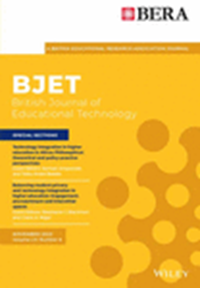A critical look at equity in international doctoral education at a distance: A duo's journey
Abstract
This collaborative, reflective research paper delves into the doctoral socialization experiences of two international students navigating pre- and postrelocation realities amid COVID-19 complexities. The authors juxtapose our journeys in the Global South (pre-relocation) and the Global North (postrelocation), scrutinizing learning outcomes, access to resources and academic and professional opportunities. Through journaling and deep self-reflection, this research illuminates stark disparities in educational accessibility, mainly rooted in the undeniable global technological divide. In this collaborative, reflective paper, my colleague and I unveil the unique challenges of distance learning, highlighting the resulting academic isolation and inequitable doctoral socialization experiences. Furthermore, the study reflects on the disproportionate access to academic and professional growth opportunities accompanying geographical mobility, emphasizing educational success and capacity-building inequities. This collaborative, reflective research contributes to the ongoing debate on IHE's impact on equity, particularly regarding the potential exacerbation of global disparities through internationalization at a distance. In this collaborative research, the authors attempt to answer the question: ‘How do experiences under internationalization at a distance compare to or diverge from the experiences of geographically mobile students?’ By adopting counter-storytelling as the interpretive framework, this collaborative, reflective paper hopes to amplify and validate the stories of international students from the Global South and how they, the authors, experience internationalization at a distance in their doctoral education. The nuanced findings inform institutional policies promoting more equitable and inclusive practices in international higher education.
Practitioner notes
What is already known about this topic (internationalization at a distance [IaD])
- IaD enables students from diverse geographical locations to access educational resources and opportunities without physical relocation, promoting inclusivity and global participation.
- IaD offers flexible learning options that cater to diverse schedules and personal circumstances, allowing learners to balance academic pursuits with other commitments.
- IaD can reduce costs associated with traditional education, such as travel, accommodation and living expenses, making higher education more accessible and affordable for students from economically disadvantaged backgrounds.
What this paper adds
- Documents the structural challenges inherent in IaD, particularly through the lens of North African women international doctoral students, offering nuanced insights into their experiences amid and after the COVID-19 pandemic.
- Provides a detailed exploration of the mental and emotional toll of remote learning on distant learners, highlighting specific challenges such as isolation and feelings of academic inadequacy, which are often overlooked in traditional narratives of educational equity.
- Offers actionable recommendations for policy and institutional change aimed at improving support systems and enhancing educational equity for international students based on the documented experiences and challenges highlighted in the study.
Implications for practice and/or policy
- Advocate for investments in digital libraries and partnerships with global repositories to improve access to educational resources for international students, particularly those from the Global South.
- Promote development programmes to integrate diverse perspectives and culturally responsive pedagogies into curriculum design and teaching practices to enhance inclusivity and support diverse student populations.
- Encourage the implementation of policies that support mental health and well-being among international students, including virtual counselling services, mentorship programmes and flexible learning options tailored to diverse time zones and personal circumstances. These measures aim to mitigate the challenges exacerbated by IaD and promote equitable educational opportunities globally.




 求助内容:
求助内容: 应助结果提醒方式:
应助结果提醒方式:


